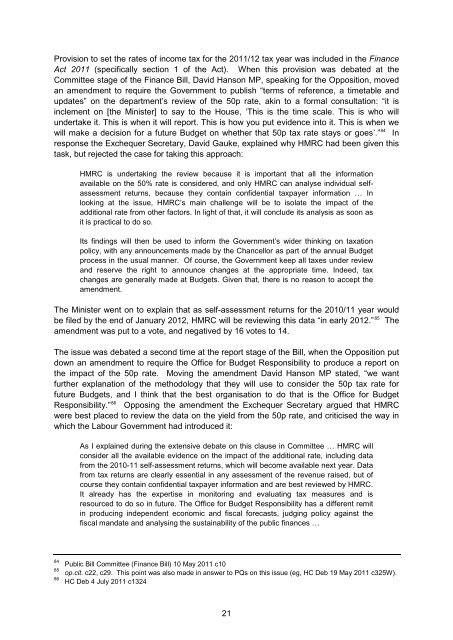Income tax: the additional 50p rate ( PDF, 41 pages ... - Parliament
Income tax: the additional 50p rate ( PDF, 41 pages ... - Parliament
Income tax: the additional 50p rate ( PDF, 41 pages ... - Parliament
You also want an ePaper? Increase the reach of your titles
YUMPU automatically turns print PDFs into web optimized ePapers that Google loves.
Provision to set <strong>the</strong> <strong>rate</strong>s of income <strong>tax</strong> for <strong>the</strong> 2011/12 <strong>tax</strong> year was included in <strong>the</strong> Finance<br />
Act 2011 (specifically section 1 of <strong>the</strong> Act). When this provision was debated at <strong>the</strong><br />
Committee stage of <strong>the</strong> Finance Bill, David Hanson MP, speaking for <strong>the</strong> Opposition, moved<br />
an amendment to require <strong>the</strong> Government to publish “terms of reference, a timetable and<br />
updates” on <strong>the</strong> department’s review of <strong>the</strong> <strong>50p</strong> <strong>rate</strong>, akin to a formal consultation: “it is<br />
inclement on [<strong>the</strong> Minister] to say to <strong>the</strong> House, ‘This is <strong>the</strong> time scale. This is who will<br />
undertake it. This is when it will report. This is how you put evidence into it. This is when we<br />
will make a decision for a future Budget on whe<strong>the</strong>r that <strong>50p</strong> <strong>tax</strong> <strong>rate</strong> stays or goes’.” 84 In<br />
response <strong>the</strong> Exchequer Secretary, David Gauke, explained why HMRC had been given this<br />
task, but rejected <strong>the</strong> case for taking this approach:<br />
HMRC is undertaking <strong>the</strong> review because it is important that all <strong>the</strong> information<br />
available on <strong>the</strong> 50% <strong>rate</strong> is considered, and only HMRC can analyse individual selfassessment<br />
returns, because <strong>the</strong>y contain confidential <strong>tax</strong>payer information … In<br />
looking at <strong>the</strong> issue, HMRC’s main challenge will be to isolate <strong>the</strong> impact of <strong>the</strong><br />
<strong>additional</strong> <strong>rate</strong> from o<strong>the</strong>r factors. In light of that, it will conclude its analysis as soon as<br />
it is practical to do so.<br />
Its findings will <strong>the</strong>n be used to inform <strong>the</strong> Government’s wider thinking on <strong>tax</strong>ation<br />
policy, with any announcements made by <strong>the</strong> Chancellor as part of <strong>the</strong> annual Budget<br />
process in <strong>the</strong> usual manner. Of course, <strong>the</strong> Government keep all <strong>tax</strong>es under review<br />
and reserve <strong>the</strong> right to announce changes at <strong>the</strong> appropriate time. Indeed, <strong>tax</strong><br />
changes are generally made at Budgets. Given that, <strong>the</strong>re is no reason to accept <strong>the</strong><br />
amendment.<br />
The Minister went on to explain that as self-assessment returns for <strong>the</strong> 2010/11 year would<br />
be filed by <strong>the</strong> end of January 2012, HMRC will be reviewing this data “in early 2012.” 85 The<br />
amendment was put to a vote, and negatived by 16 votes to 14.<br />
The issue was debated a second time at <strong>the</strong> report stage of <strong>the</strong> Bill, when <strong>the</strong> Opposition put<br />
down an amendment to require <strong>the</strong> Office for Budget Responsibility to produce a report on<br />
<strong>the</strong> impact of <strong>the</strong> <strong>50p</strong> <strong>rate</strong>. Moving <strong>the</strong> amendment David Hanson MP stated, “we want<br />
fur<strong>the</strong>r explanation of <strong>the</strong> methodology that <strong>the</strong>y will use to consider <strong>the</strong> <strong>50p</strong> <strong>tax</strong> <strong>rate</strong> for<br />
future Budgets, and I think that <strong>the</strong> best organisation to do that is <strong>the</strong> Office for Budget<br />
Responsibility.” 86 Opposing <strong>the</strong> amendment <strong>the</strong> Exchequer Secretary argued that HMRC<br />
were best placed to review <strong>the</strong> data on <strong>the</strong> yield from <strong>the</strong> <strong>50p</strong> <strong>rate</strong>, and criticised <strong>the</strong> way in<br />
which <strong>the</strong> Labour Government had introduced it:<br />
As I explained during <strong>the</strong> extensive debate on this clause in Committee … HMRC will<br />
consider all <strong>the</strong> available evidence on <strong>the</strong> impact of <strong>the</strong> <strong>additional</strong> <strong>rate</strong>, including data<br />
from <strong>the</strong> 2010-11 self-assessment returns, which will become available next year. Data<br />
from <strong>tax</strong> returns are clearly essential in any assessment of <strong>the</strong> revenue raised, but of<br />
course <strong>the</strong>y contain confidential <strong>tax</strong>payer information and are best reviewed by HMRC.<br />
It already has <strong>the</strong> expertise in monitoring and evaluating <strong>tax</strong> measures and is<br />
resourced to do so in future. The Office for Budget Responsibility has a different remit<br />
in producing independent economic and fiscal forecasts, judging policy against <strong>the</strong><br />
fiscal mandate and analysing <strong>the</strong> sustainability of <strong>the</strong> public finances …<br />
84<br />
85<br />
86<br />
Public Bill Committee (Finance Bill) 10 May 2011 c10<br />
op.cit. c22, c29. This point was also made in answer to PQs on this issue (eg, HC Deb 19 May 2011 c325W).<br />
HC Deb 4 July 2011 c1324<br />
21

















